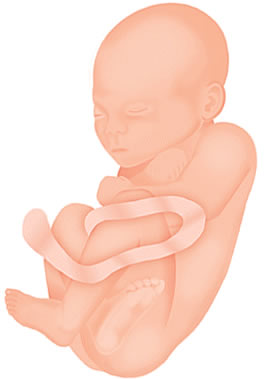Baby Development: 1 Week Old
How big is your baby? This week your baby will be weighing around 7 pounds and measuring 20 inches if he/she was of average size. Your baby’s heart rate will be around 100 to 150 beats per minute and will breath at about 50 beats per minute. Umbilical Cord Care Almost every baby goes home from the hospital with a stump where the remaining umbilical cord is still attached. It usually take 7-10 days for it to heal and eventually fall off and until then it is imperative that you keep it dry and clean, to promote healing and to prevent any infection from taking place. Cleaning the umbilical cord doesn’t take much work. Simply wipe the cord with a ball of cotton wool dipped in alcohol. You may also want to just fold the top of the diaper down so that it does not rub against it and cause any irritation to your baby. Penis Care for Circumcised and Uncircumcised Boys If you have had your son circumcised then you may notice that his penis is a little red or may even be secreting a yellowish fluid. Both of these are signs that it is healing. When you change his diaper you may want to put some petroleum jelly or your doctor may have given you some gauze to help keep it clean. It is important that you change the dressing frequently to prevent any infection. Circumcision usually takes 7-10 days to fully heal. If you have not had your son circumcised, you will still need to ensure that his penis is clean and free of any infection. Simply gently pull back the foreskin and wash the ares thoroughly each time you change his nappy. Feeding Your Baby Feeding your baby is one of the most important things you can do. You will know when she /he is hungry; she/he will show signs of hunger either by fussing, putting his/her hands in his/her mouth or perhaps turning his/her head to the side and opening his/her mouth. Most new born babys will eat every 2-4 hours and you will want to feed at regular intervals in order to start building a regular routine, or, perhaps you may want your baby to set the schedule. Your baby will usually turn his/her head away from the bottle or beast once they have had enough. Nearly all babies need to be burped once they have been fed and some may even need to be burped during a feed. There are a number of different methods which you can use to burp your baby. You will just need to find the one with which you have the most success. Lets look at those different methods now.- Hold your baby seated in your lap, with one hand under his/her chin. This helps to keep his/her body up straight and the windpipe open as well as support his/her head. With your other hand gently rub or pat his/her back until you hear the burp.
- Hold your baby against your body facing you with his/her head resting over your shoulder. With your other hand gently rub or pat his/her back until you hear the burp.
- Lie your baby face down across your lap while seated, with his/her face turned to the side, and your one leg slightly higher than the other, (on the side where his/her head is). With your other hand gently rub or pat his/her back until you hear the burp.
Baby Development Milestones This Week
Physical Development
- Responds to sudden changes with entire body
- May be able to lift his/her head a little
- When his/her palms are pressed he/she may open his/her mouth
- Controls swallowing and rooting by reflex
- Sleeps between 19-20 hours per day
- Moves bowls often and sporadically
- Blinks at bright lights
- Eyes tend to turn outward
- Moves head from side to side
- Distinguishes tastes, and will prefer sweet already
Mental & Social Development
- Quiets when picked up or in response to any firm pressure
- Stops sucking to look at something
- Shuts out disturbing stimuli by going to sleep
- Shows excitement and distress
- Looks at person briefly
- Becomes alert and may try to focus on human voice
- Learns to expect foods at certain times
- Difficulty in breathing- If he/she sucks in his/her ribs when she breaths or if his/her lips look blue.
- Vomiting after most feedings, especially if it is brown or green, or a projectile vomit.
- A fever of 100.6F (38.1C) or higher, measured rectally
- Yellow appearance
- Looks or acts differently, such as extreme lethargy or sleepiness, highly pale or irritable.
Before your baby was born, he/she was in a pretty tight environment, with little room to move. Once born he/she may feel a little insecure by the lack of confinement. One way to get around this is to “swaddle” your baby. Swaddling is basically to wrap her tightly in a soft blanket.
baby week1



